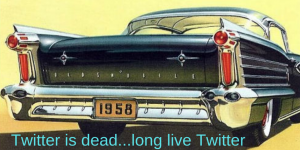Rivers of Thought
Life, Leadership, Business & Technology

I recently had the opportunity to speak to a class of college students at IUPUI. We discussed a wide variety of topics including: globalization, outsourcing, culture, career choices and professional networking. It was the latter topic that got me in trouble. You see, I mentioned Twitter. My comment was met with some laughter, some eye rolls and almost in unison, “no one uses Twitter any more. It’s for Olds.”
Olds, now there’s a new one. Olds. I needed no explanation for what it meant. One need to look no further than the gray highlights in my hair and beard to know I fit squarely in the definition of Olds. UGH! Somehow this stung a bit more than being introduced last year as one of the “elder statesmen” of the Information Technology community. THAT came from one of my peers. This came from a group of students young enough to be my grandkids. OK, so yes I am an Olds.
Now, back to Twitter. Ok, class. You may be off using one of the myriad of applications that have replaced Twitter in the thumbs of your generation. But I am not talking about connecting with your peers. I’m talking about connecting with us Olds. Those of us who are in leadership and management positions, those of us who will be hiring you in May when you graduate. Why is connecting with us on Twitter (and LinkedIn) important? To learn. For all of us to learn. Here’s what I mean.
Leveraging the information shared on Twitter is an excellent way to keep up with today’s business news. Much of the tech news I read is a result of a link being shared on Twitter. If Isaac, or Charlie, or Paul or one of the other few thousand people I follow wrote new content, I want to read it. But it is also not about what they wrote, but what the read and found important enough to share it with me (as a member of their network). It’s up to the minute, fresh, it gives you a glimpse into what they are thinking.
I follow a Twitter list. The 100 Most Social CIOs. Imagine that. I can get a peek inside the mind of 100 CIOs in an instant. Just today, here are some of the topics:
- If you fail at character, you fail at leadership – 7 Crucial Pieces of Advice That Will Change the Way You Lead
- #CIO must transition away from legacy IT, easier said than done but it must happen. What is your plan? #cdo – David Chou
- The Tao Of Zero Trust
- 15 KPIs to track devops transformation
It is a way to keep track of an industry (technology) that is changing at an exponential pace!
Some of my most trusted mentors, I “met” on Twitter. I started following them, reading what they shared. Re-Tweeted them, adding my own thoughts. Direct messaged them with questions. Slowing built relationships. Some of them I have now met in person during my travels, some I have interviewed for blog series, others I have interviewed on our podcast.
I also follow our company. I want to see what others are saying about us. Are our products meeting their needs or not? Are we living up to their standards? Who is interacting with our company posts? What things are on their minds? I follow our major competitors for much of the same reasons.
Need another reason to hang out with us Olds on Twitter? When you are interviewing for that dream job, how about following the company. What are they Tweeting about? Who is interacting with their Tweets? Are people generally reacting in a positive manor, or is the Twittersphere full of bad customer services Tweets? Find out the names of the people who are interviewing you. Follow them on Twitter, what things are they thinking about? How do those things apply to the position you are seeking? You can work those topics into your answers during the interview.
Follow people that are in similar roles and other companies. What things are on their mind? Reach to them directly. Find out what’s a “day in the life” of that position. It can be valuable information and it will set you apart from the hundreds, if not the thousands of candidates vying for that same position. You will be amazed how willing they will be to help.
Keeping up with your peers is important. I am not suggesting you abandon the channels you use to stay in touch, I am suggesting you give Twitter another chance as you enter the workforce. It will be a valuable tool for your career.
Now, I’m going to go back to my Rolling Stones music and reminisce about the forty years that have passed since I sat where you are sitting. (btw HOW old is Jagger?)
(Image courtesy of www.ClassicCarCatalogue.com)

Many of you are also subscribers to my newsletter (“What? You have a newsletter”, you ask? Why yes, I do. You can sign up here), let me start again. Those of you who read my January newsletter saw the 2019 goal I have set for myself to write my next book. The book will be Amplify Your Leadership, in it I will explore ten traits of a leader and the actions you can take to grow as a leader.
Some of you have heard my keynote address “Everything I Learned About Leadership…I Learned from Lewis and Clark”. This book will build upon those themes and ideas to serve as a guide as you explore what it means to be a leader in your own life (professional and personal).
This is where you come in! I need your stories. Have a story of a great (or not-so-great) leader? I would love to hear from you. No, you don’t need to write like Ernest Hemingway. Just tell me the story. If it is one I select to be included in the book, we can set up a time to talk live, I will take furious notes, and then wordsmith for the manuscript. Of course, I will give you full acknowledgement in the book (how cool is that?!!?).
Here’s how I envision this working. Periodically, I will post here and in my newsletter (you do remember I have a newsletter, right?) asking for stories related to a specific trait of a leader. If you have an example of a leader in your life (or you yourself) exhibiting that trait (or not exhibiting that trait) just jot a few sentences (or paragraphs, if you like) and either leave it in the comments or send me an email at [email protected].
Our journey will delve into these ten traits of a leader:
A Leader:
is Transparent
is Honest and Truthful
is Accountable
is Patient
Seeks Input
is Committed
has Integrity and Character
Admits Mistakes (aka vulnerable)
is Flexible
Takes Risks
If one or more of these sparks an idea in your mind, you don’t have to wait until I post about that specific trait…send me your story today!
Are you ready? Let’s start with: Transparency.
BusinessDictionary.com defines transparency as:
- See-through, clear piece of acetate used for projecting data, diagrams, and text onto a screen with an overhead projector.
2. Lack of hidden agendas and conditions, accompanied by the availability of full information required for collaboration, cooperation, and collective decision making.
3. Minimum degree of disclosure to which agreements, dealings, practices, and transactions are open to all for verification.
4. Essential condition for a free and open exchange whereby the rules and reasons behind regulatory measures are fair and clear to all participants.
Read more: http://www.businessdictionary.com/definition/transparency.html
OK, we can probably throw out the first one for our purposes. But, does anyone remember using those crazy overhead projectors and transparencies? As I think about leaders and transparency, I tend to focus (like how I did that, overhead projectors…focus…) on the second definition, but, the third can really come into play as well.
Who, in your experience, has exhibited transparency and what did that help drive in your business or life? Have you worked for someone who was not transparent? What did that cause in your organization?
Send me your stories!
“Bueller. Bueller.”
 For some, the title of this post will conjure up images of Sean Hayes’ character on the first iteration of Will and Grace, Jack McFarland, throwing both his hands up, palms forward to face-box himself and exclaiming, “Just Jack”. While that moment became iconic in the annals of television, I’d like to share a different moment…a moment I had recently with my dad, Gene. No, face-box, “Just Gene”.
For some, the title of this post will conjure up images of Sean Hayes’ character on the first iteration of Will and Grace, Jack McFarland, throwing both his hands up, palms forward to face-box himself and exclaiming, “Just Jack”. While that moment became iconic in the annals of television, I’d like to share a different moment…a moment I had recently with my dad, Gene. No, face-box, “Just Gene”.
Many of you know, my dad is suffering from a somewhat rare form of dementia: behavioral-variant Frontotemporal Dementia or bvFTD. This evil disease, although in the same family as Alzheimer’s, doesn’t manifest itself in the same way. Dad still recognizes everyone, can recall the minutest detail of something that happened 30 years ago, or 30 minutes ago, and, other than having an 88 year-old body, is in decent physical health. I sometimes describe him as a person with cognitive abilities of a 5 year-old, with the memories of 88 years.
One of the ways in which this disease manifests itself is in the form of delusions. The formal definition according to Dictionary.com is “an idiosyncratic belief or impression that is firmly maintained despite being contradicted by what is generally accepted as reality or rational argument, typically a symptom of mental disorder.” For dad, this means he experiences things around him that are not real, but he firmly believes they are. For example, my mom comes to visit him quite often. Mom passed away five years ago…and he knows this, yet she visited, or they took a trip, or even played golf together. Like a “real memory” he can describe these events in great detail and these details rarely change as he retells the story time and time again.
When he first started experiencing delusions, I would calmly and matter of factly explain to him that they are not real, that he really didn’t go to Chicago last week, or that his ceiling light did not move three feet across the room. As this delusions grew longer, more involved, and more intertwined with reality, his doctors advised us to just go along with the story. Unless he is frightened, endangering himself or others, just go along.
We have had many visits these past few months where he is in midst of a delusion and incorporates us in. On one such visit, he was clearly leading a church meeting. There were twenty people in his room. When we arrived, he interrupted the meeting to introduce us to the group, told us he would be wrapping the meeting up shortly, and then we could visit. As you probably deduced, the room was empty save for me, my wife Carmen, our grandson Jordan, and, of course, dad.
All of which brings us to my story of “Just Gene”. I stopped in to visit with dad a few days ago. When I entered his room, I found him like we find him quite often. Laying on his bed, fully clothed (including shoes), resting. It was about 5:30 in the evening and he had just returned from dinner down the hall. I pulled up his walker, which has a seat as a part of it, and sat down next to the bed for our visit. We talked about his day, we talked about his meal, we talked about his tv not working (uh, I turned the cable box on and wha-la it worked). I changed his clocks, it being the Monday after the fall time change. I crawled on the floor and picked up his phone, knocked there when he had tried to get up at some point in the last few days. We talked about my upcoming trip to LA, we talked about Carmen not feeling well, we talked about little Jordan and Braxton.
“So, Dad, what else have you been doing? Have you been down to activity time?”
“No, I’ve been way too busy.”
“Busy, doing what?”
“Well, I don’t know how these groups find me, but I keep getting asked by these church groups to help them with this problem or that problem. Groups from Chicago, from St. Louis, from all over. I don’t know how they even know who I am.”
“Well, dad, of course they know you. You lead the baptist churches here in Indiana for years. You were a very well respected expert on congregations and church management. Of course, they want insights from the Reverend Doctor.”
“I suppose you are right. But, this last one did not go well.”
“What do you mean?”, I asked.
“They just weren’t getting it. I could not get them to understand. I finally had to give up. I needed to get back here and they just wouldn’t listen.”
“I suppose that would be frustrating, but you had to run into that many times during your career, right?”
“Not often, but sometimes. One of my congregations was especially difficult. It always hurt deeply when I saw them going in the wrong direction, for the wrong reasons. We had a couple of churches leave the Association. They felt that was what was best for them.”
“I have always been proud of being the son of Reverend Ton. I loved to listen to you preach. I loved it when you got into character and acted like you were one of the Apostles, that always got my attention,” I told him.
“Yes, sometimes you have do something a bit different to get your point across. You just can’t stand up there behind the pulpit week after week. But, you know, here I am not Reverend Ton. Most don’t even know or care. Here I’m just Gene. And, I kind of like that.”
There you have it. Just Gene. And that feels good to him.
I have to admit, it is something I rarely have thought about…the sacrifices. The sacrifices he, and countless others, had to make to follow their calling. The long hours of running the business of a church during the day, rushing home for dinner, only to have to go back to oversee the various meetings of the church at night. The need to always be “on”. Always “special”.
Just Gene.
Dad spoke of missing so much of our lives as kids, instead, having to rely on mom as the primary parent because she was home…and he was not. It occurred to me, even something as simple as visiting someone’s home for dinner, and always being called upon to say the blessing, because, after all, he WAS the Reverend.
Just Gene.
I remembered the times he and I would go to play golf. Invariably, as a twosome, the course would pair us up with another twosome to complete a foursome and off we would go. Dad always introduced himself as Gene. Just Gene. Not Gene Ton, not Reverend Ton, just Gene. After one such round in which we had been paired with a particularly “rowdy” gent, who liked to swear and tell off-color jokes, I asked him why he didn’t tell him who he was or what he did for a living. “Well, because it would make him uncomfortable and he would change the way he was acting. He was here to relax, play golf and blow off steam.”
I have no doubt, knowing my dad, he would do it for the other person. But, the realization was dawning on me, that maybe, just maybe, he was giving himself a break from being the Reverend Doctor Ton. Maybe in some deep recesses of his brain, he needed to be “Just Gene” occasionally. Maybe that is part of the battle going on within his mind today. As the disease takes over more and more of his brain, it is a tug of war between the calling of his lifetime…to lead, to counsel, to challenge, to comfort…and his desire to be…Just Gene.

Insights is the weekly, thought-provoking newsletter from Jeffrey S. Ton.
Every Tuesday – Delivered to your inbox.
A different focus each week:
Leadership Thought – A lesson-learned, an insight shared
Leadership Q&A – A response to a reader’s or a connection’s question
Leadership Spotlight – A highlight of a person or company helping others to grow their leadership
Rivers of Thought – A more personal thought, observation or musing



